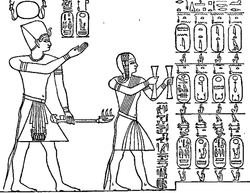
Back قائمة الملوك بأبيدوس Arabic لسته ابيدوس للملوك ARZ Абидусалъул сияхӀ AV Abidos siyahısı Azerbaijani Абідаскі спіс цароў (Сеці I) Byelorussian Абидоски списък Bulgarian Llista d'Abidos Catalan Abydoský královský seznam Czech Königsliste von Abydos (Sethos I.) German Κατάλογος βασιλέων της Αβύδου Greek

The Abydos King List, also known as the Abydos Table, is a list of the names of 76 kings of ancient Egypt, found on a wall of the Temple of Seti I at Abydos, Egypt. It consists of three rows of 38 cartouches (borders enclosing the name of a king) in each row. The upper two rows contain names of the kings, while the third row merely repeats Seti I's throne name and nomen.
Besides providing the order of the Old Kingdom kings, it is the sole source to date of the names of many of the kings of the Seventh and Eighth Dynasties, so the list is valued greatly for that reason.
This list omits the names of many earlier pharaohs. The bulk of these appear to have been left out because although they claimed royal titles and rule over all Egypt, their actual authority was limited to only part of the country. This category includes all the rulers of the Ninth and Tenth Dynasties, the early rulers of the Eleventh Dynasty (Mentuhotep I, Intef I, Intef II, and Intef III), all the rulers of the Thirteenth Dynasty, and all of the rulers of Second Intermediate Period (including the Hyksos Fifteenth Dynasty, who may also have been seen as illigitimate because they were not native Egyptian). The rulers of the chaotic Amarna Period (Akhenaten, Smenkhkare, Neferneferuaten, Tutankhamun, and Ay), seem to have been removed for reasons of political propaganda or as a form of damnatio memoriae; their reigns were within living memory in Seti's day, and the repudiation of the Amarna Period had been state policy since the reign of Horemheb (who had chosen Seti's father Ramesses I to succeed him). Two pharaohs known to have been women, Sobekneferu and Hatshepsut, are also excluded, most likely due to their gender. Finally, Mentuhotep IV may have been excluded for political reasons (having been overthrown by his vizer and successor Amenemhat I) or simply due to a lack of sources for his brief reign.[1]
- ^ Dominic Perry (15 August 2023). "187: The Abydos King List". The History of Egypt Podcast (Podcast).